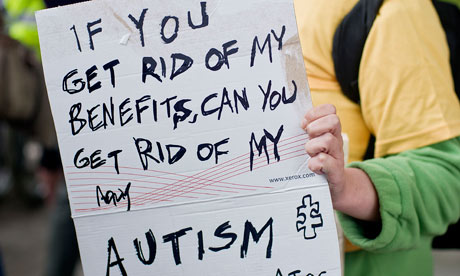
With the welfare reform bill still pinging and ponging between the houses of parliament – there's another vote expected on Wednesday – the final verdict is not quite in, but the government has already clawed back most of the ground. Specific amendments – which would, for example, have safeguarded the benefit rates of disabled children and their entitlements when they reach adulthood – have given way to vague ministerial commitments to undertake some form of review. The great battle to double the proposed time limit on the main incapacity benefit from one to two years has ended in an amendment that gives Whitehall the power to postpone the cut-off at some later date – in the event that it has a rethink. No wonder ministers were happy to accept that one.
On some other questions campaigners are left with more crumbs of comfort. Although the Lords' demand that cancer patients be exempted from the time limit has been overturned, there is at least the promise that days spent enduring chemotherapy will not count against the clock, and a pledge to rethink ways that certain criteria are applied in cancer cases, which may smooth the roughest edges. The bishop-led charge to protect child benefit from George Osborne's £26,000 benefit cut was pushed back in the Commons, but the government has offered families thrown out of work a nine-month grace period, before the cap bites. That extends some protection in redundancy cases, but none to those (more numerous) parents who have long been without work, either because no jobs are available or because childcare or health represents an insurmountable barrier.
Full article HERE
It seems that, despite protestations from media outlets like The Guardian and people like myself, very little is going to change with regards to recent plans for benefit or welfare reform.
I'm not sure if this is down to a lack of reporting of the real issues by the media, or if it's down to a push from both the media and the government to make people think the worse about unemployed people during this period and shift the blame over to them.
Either way, I found an interesting letter from Professor Alan Walker that discusses this issue in a brief, yet succinct, way:
Your leader on the work experience furore was excellent as far as it went (25 February), but why not expose how excessively punitive the British system is in comparative terms? Out of 27 EU countries, only Estonia has a higher level of poverty among unemployed people than this country. This is because the benefits paid here are among the lowest in Europe. Over the last 40 years unemployment benefit has been cut by 50% as a proportion of average earnings, to just 10%. (Over the same period the total remuneration of FTSE chief executives rose by more than 1,000%.)
Rather than taking for granted public attitudes towards welfare, they should be seen as fluid and often based on little knowledge. If politicians started to make the case for decent welfare, good quality jobs and fair wages, and if pollsters asked if people really want their country to be vying for the bottom place in Europe, we might see apparently entrenched public attitudes begin to change. In the absence of such challenges the base elements in the tabloid press will always triumph. As in the 1930s and 1980s, when unemployment rises, it is always the unemployed that are in their firing line.
Letter found HERE
The emphasis at the end was added by me.
I can't help but agree with him on this issue. There has been a distinct absence of challenges within the media, and those that do challenge the consensus are often drowned out. It has only been at the last minute that an outcry to this reform has been heard at all, and as the main article states the government are already picking themselves back up and clawing back their position.
The unemployed are once again in the firing line, left to defend themselves from attacks by the government, attack by the tabloid press, and attacks from the general public.
It is not the unemployed that have screwed up the country, it is not the unemployed that have messed up the welfare system, yet we are taking the blame.
No comments:
Post a Comment